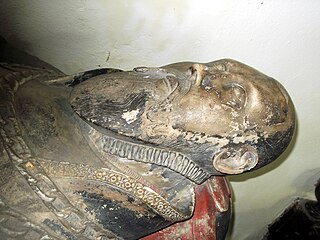
Jerome Corbet (born in the 1530s; died 1598) was an Elizabethan politician and lawyer of Shropshire landed gentry background. A brother of Sir Andrew Corbet [1] and, like him, a supporter of the Elizabethan Religious Settlement, he became an MP for Bridgnorth and a member of the Council in the Marches of Wales.

The landed gentry, or simply the gentry, is a largely historical British social class consisting in theory of landowners who could live entirely from rental income, or at least had a country estate. It was distinct from, and socially "below", the aristocracy or peerage, although in fact some of the landed gentry were wealthier than some peers, and many gentry were related to peers. They often worked as administrators of their own lands, while others became public, political, religious, and armed forces figures. The decline of this privileged class largely stemmed from the 1870s agricultural depression; however, there are still a large number of hereditary gentry in the UK to this day, many of whom transferred their landlord style management skills after the agricultural depression into the business of land agency, the act of buying and selling land.

Sir Andrew Corbet was a prominent English Protestant politician of the mid-Tudor and early Elizabethan periods: a member of the powerful Council in the Marches of Wales for a quarter of a century. Drawn from the landed gentry of Shropshire and Buckinghamshire, he was twice a member of the Parliament of England for Shropshire.
The Elizabethan Religious Settlement, which was made during the reign of Elizabeth I, was a response to the religious divisions in England during the reigns of Henry VIII, Edward VI, Lady Jane Grey, and Mary I. This response, described as "The Revolution of 1559", was set out in two acts of parliament. The Act of Supremacy of 1558 re-established the Church of England's independence from Rome, with parliament conferring on Elizabeth the title Supreme Governor of the Church of England while the Act of Uniformity of 1559 re-introduced the 1552 Book of Common Prayer (BCP) which contained the liturgical services of the church with some modification in a more Catholic direction regarding the doctrine of the Real Presence; permission to use the traditional Mass vestments other articles of clergy dress in accordance with the Ornaments Rubric of 1549 which stated that these were such as in use in the first year of the reign of Edward VI when services were still in Latin; and liturgical furniture The BCP became the yardstick of Anglicanism, which came to see its identity mainly in liturgy and institutional continuity rather than in a systematic school or confessional theology; and also to a lesser extent as set forth in the Thirty-Nine Articles of Faith which sought to navigate a middle way between Roman Catholicism, Continental Protestantism and radical sects.















